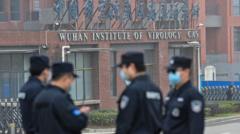As investigations into the origins of Covid-19 continue, new insights from Germany have emerged, suggesting that the country's foreign intelligence service, the BND, believed there was an 80-90% chance that the coronavirus leaked accidentally from a laboratory in Wuhan, China. This assessment, revealed by two German newspapers, was part of an operation called Project Saaremaa carried out in 2020 but remained undisclosed until now.
The report indicates that the BND found evidence pointing towards experiments at the Wuhan Institute of Virology involving viruses being altered for increased transmissibility in humans, reflecting serious safety violations at the facility. This information was initially presented to the office of then-Chancellor Angela Merkel but did not see the light of day until recently.
While China continues to deny any allegations of a lab leak, insisting that only scientific inquiry can determine the origins of Covid-19, they reference a World Health Organization investigation that rated lab leak theories as "extremely unlikely." Critics of the WHO’s findings argue the inquiry didn't sufficiently explore the lab-leak possibility, dismissing it too quickly in contrast to other hypotheses.
The lab leak theory, once a contentious subject, is now gradually being accepted by some intelligence agencies; the US CIA noted a "research-related origin" seemed more plausible than a natural spillover. Analysts suggest that as time goes on, doubts about the natural origins of Covid-19 are rising, especially given the lack of a direct ancestral virus discovered in bats or other species.
The ongoing discourse over the virus's origins continues to provoke division among the scientific community, policymakers, and the public, highlighting the need for further investigation and evidence gathering.
The report indicates that the BND found evidence pointing towards experiments at the Wuhan Institute of Virology involving viruses being altered for increased transmissibility in humans, reflecting serious safety violations at the facility. This information was initially presented to the office of then-Chancellor Angela Merkel but did not see the light of day until recently.
While China continues to deny any allegations of a lab leak, insisting that only scientific inquiry can determine the origins of Covid-19, they reference a World Health Organization investigation that rated lab leak theories as "extremely unlikely." Critics of the WHO’s findings argue the inquiry didn't sufficiently explore the lab-leak possibility, dismissing it too quickly in contrast to other hypotheses.
The lab leak theory, once a contentious subject, is now gradually being accepted by some intelligence agencies; the US CIA noted a "research-related origin" seemed more plausible than a natural spillover. Analysts suggest that as time goes on, doubts about the natural origins of Covid-19 are rising, especially given the lack of a direct ancestral virus discovered in bats or other species.
The ongoing discourse over the virus's origins continues to provoke division among the scientific community, policymakers, and the public, highlighting the need for further investigation and evidence gathering.


















